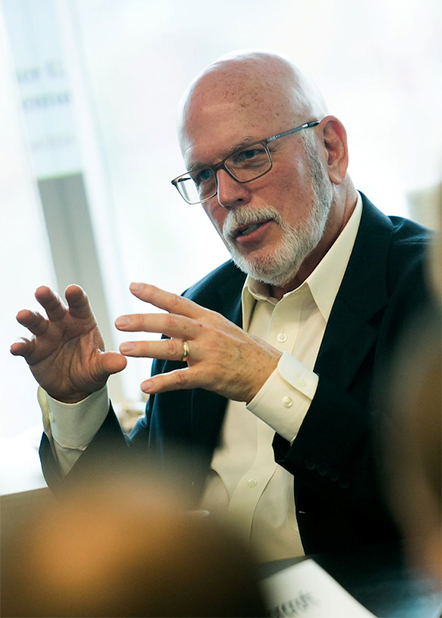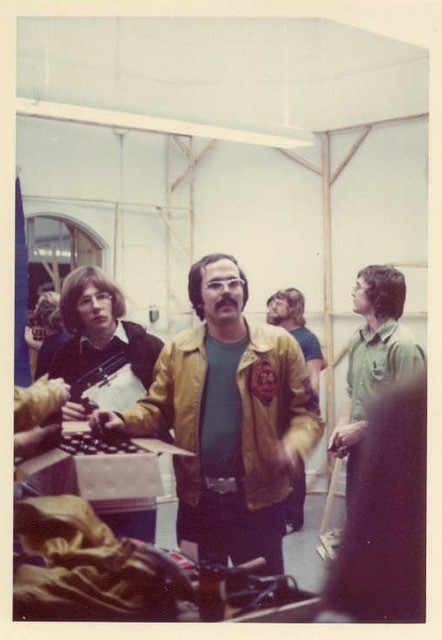Brian Sterling, Sc’74, has made his way through a variety of industries and has taken on many roles in his career. From executive management to consulting, from DuPont to D.C., he has seen the full length of the corporate ladder.
In this Q&A, we learn about the many different jobs and projects that Brian has taken on, his successes and exciting experiences, and what he is doing now as he approaches 50 years of professional life.
What does SCS Consulting do?
SCS Consulting is a boutique advisory firm that services the agriculture, food, and cannabis industries. We provide strategy services and advise on the development of new businesses and markets, as well as organizational changes for existing companies. Our initial focus was on food traceability across Canada, and we have since grown into the tracing of various other products, including cannabis.
What does a typical day look like for you?
I am very selective about the projects we work on today. Four years ago, we would be talking to several clients about business development, conducting market and product research, and drafting recommendations. When the pandemic hit, our research work did not slow down, however most of the clients that we advised did not have many of their staff available anymore, which impacted their and our business.

How did you get into the business of consulting?
Allow me to start from the beginning. In my third year of undergrad, I realized that I did not want to be a chemical engineer. This was very disappointing because I was always good at chemistry and math, but most of becoming a chemical engineer was not learning about the core chemistry I was so keen on studying. I also wanted my work to be more practical in nature and involved in providing services to a customer or working with implementing business plans. With this mindset, I have worked for the last 40-odd years not doing any chemical engineering. Although my Stats courses have been very useful!
Along the way I was exposed to the world of consulting. I had seen teams from various consulting companies that would help an organization by examining and conducting an analysis on what processes needed to be changed. I was impressed to see how efficiently these companies worked and decided I would shift my career to working as a consultant. That turned out to be a wise decision – it fit my personal goals and forced me to learn new things!
What was your career path?
I spent my first twenty years in industry with the DuPont company in Canada and the USA, taking on a variety of management positions, ending with a role as business unit director. After leaving, I switched into consulting, debuting in the advisory side of implementing large-scale enterprise computer systems. We would work with clients to develop the business strategy for installing these software systems to optimize productivity.
After about eight years I moved into a consulting organization that wanted to expand its clientele. One of the industries I gravitated to was food, and that drew me into food traceability. I soon realized that food traceability was an area with which the industry was struggling, and that I had just caught the front-end of that problem. I first needed to learn a great deal about food traceability and, between all the clients and conferences, I was constantly finding the new limits that could be reached in the industry.
After a few years, I was asked by a board of directors to be the CEO of a new organization called OnTrace, which would focus on food traceability. As CEO, I learned a lot about what it means to be at the top of the business ladder, and how all my previous experience now informed my new role. It was hard work, and it was a lot of fun.
After I left in 2012, I was hired as the Managing Director at the Global Food Traceability Center in Washington D.C., which was a part of the Institute of Food Technologists out of Chicago. This took me onto a global stage and was an exciting and rewarding experience.
Since 2004, I had SCS Consulting in my back pocket, but I did not do anything with the company until I left the GFTC in 2015. I was getting close to the age where I had reached many goals and decided I now wanted to do the things I thought were fun or that would make a difference. I threw myself into this phase where I was my own boss and could pick projects and clients that I find interesting. That’s one of the reasons I now consult in the cannabis industry – it is always changing.
What is your greatest success so far in the industry?
I would say the coolest thing I did in industry was to work with a team that established a system to identify and digitally locate every agricultural, food transportation, and processing location in the province of Ontario. At the time there were no such systems in place to track these things consistently anywhere in Canada. The best part was how amazed the industry was when we completed the project two years ahead of schedule and spent only a third of the total budget. It was not that we were rushing; however the team worked very effectively to get the job done properly and ahead of schedule. In consulting, like most other work, delivery is the key.
What did you wish you knew before entering the workforce?
I wish I had a better understanding of human behavior. Engineers are not focused on the sociological behaviors that your solutions may generate, and I think it is good to understand how stakeholders may feel if or when those are implemented. This is major consideration in consulting and learning this early would have certainly been an asset when anticipating and solving clients’ problems.

How has your time at Queen's shaped your career?
I have never been the type of person to look back. Graduating from high school and university I never concerned myself with what I had left behind. Later in my career that began to change, and I started to recognize that Queen’s gave me the opportunity to grow and make some great friends. I still have many of those friends to this day. And where else would I have had the opportunity to start a new pub on campus – at Clark Hall! Or manage a science formal? Or run the Queen’s Pub for a year?
After about 25 years, I came back to the Queen’s campus and the return jogged my memory. I came to realize that all my experiences at Queen’s had really given me quite a lot, apart from my degree.
How does ethics play a role in your career?
The times I have run into ethical issues have generally been around money. Sometimes someone may need to be fired or maybe you are getting fired for reasons of money. Issues that revolve around fairness and equity are about personal ethics.
When I was approaching my final year at Queen’s, I was offered the job as the Queen’s Pub manager for the upcoming year. It was a great experience, until one day I was informed that a small amount was missing from the count after closing, which was very odd.
Usually, we would pass it off as someone giving the wrong amount of change back, but the AMS executive decided that the assistant manager who was responsible that night was guilty of taking that money and that she should be fired. I thought this was way too harsh because there was no proof that she did anything wrong. I was simply told that I needed to fire her, or else I would be fired.
In that moment I remember thinking that this decision would affect me for the rest of my life, and that made it a big deal. I still remember saying, “I guess I’m fired, then,” and completely shocked the AMS executive. I did not make that decision lightly, or for the assistant manager; I made it for me.
People questioned my choice at the time, including the assistant manager (who got fired anyway). I did not change my mind because I believed that what I was asked to do was unethical and unfair to the pub and everyone involved. It was a hard call, but the lesson stuck with me all these years.
Ethics is not something that can be easily taught in a classroom. It is something you need to live and learn for yourself. Your life experiences are at the centre of what you learn about ethics. You must be open to that learning. If it was someone else in my shoes, they might have fired the assistant manager themselves because of their experiences. I still believe I made the right choice.
‘What would you have done in that situation?’ That question is what ethics is to me.
What personal characteristics do you feel are necessary to be a successful consultant/entrepreneur?
A primary personal characteristic I encourage is fearlessness. Many people, especially students, need to realize that they are a lot smarter and more capable than they give themselves credit for. Just because there is a part of you that doubts a decision or choice, does not mean you have to obey it every time. Listen to it. And if you have the skill and knowledge, even if it’s at a basic level, there is a lot you can do now and continue to learn along the way. Remember that life is happening to you all the time; so, embrace your unknown.
The second characteristic is to be able to deal with ambiguity. For me, that is the ability to reconcile two or more competing ideas in your mind and still move forward. To be able to make progress even in the face of ambiguity. Take this pandemic for example. There is no certainty that getting fully vaccinated will protect us from COVID-19, which does not sit well with some people. The scientists working on vaccines know this as well, but they also understand statistics so they believe in their reasoning, which helps them create their own certainty in these situations. Nothing in life is certain and being able to work with that will better prepare you for the future.
Being able to reconcile competing ideas is a real-life asset. When you have a situation or problem, you need to be able to look at many sides, and not just pick a side because it initially looks better. Understanding these competing ideas and being able to reconcile them will help you make stronger decisions for yourself, your family, your company, and your clients.
The third important personal characteristic is a willingness to keep learning. When you graduate, it is tempting to think you “know it all”. It just ain’t so and some of the most fun I have had in my career has been when I was learning something about which I had very little clue.